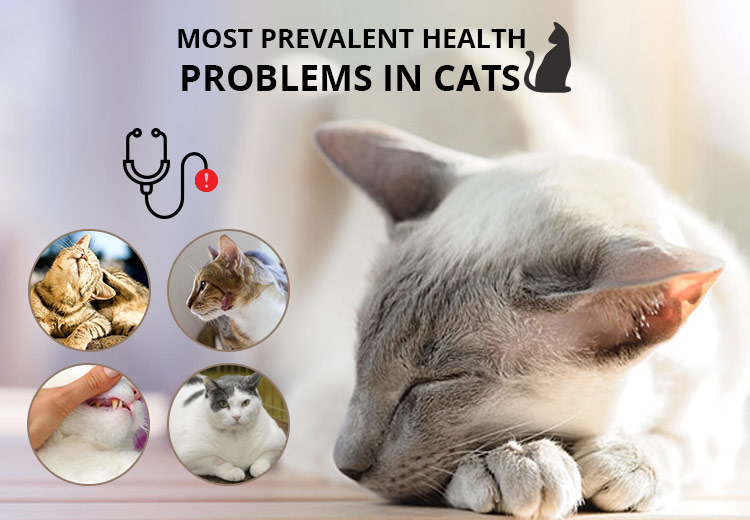Most Prevalent Health Problems In Cats

Cats are generally self-sufficient. However, when it comes to taking care of their health, cats do require some assistance. Compared to other animals, cats are quite low-maintenance, though they are susceptible to some health issues. Hence, knowing common ailments will help you recognize the early signs and symptoms of the most common health issues in cats.
If you have a cat or are considering getting one, you need to know about the frequent health issues these felines face.
#1 Lower Urinary Tract Disease
Feline Lower Urinary Tract Disease, commonly known as FLUTD, is caused due to various factors that affect the cat’s urethra and bladder. If neglected, the pain can be excruciating for your kitty. Thus, if you spot any given signs, you need to contact your vet immediately. FLUTD is a critical health issue amongst cats that can be fatal if treatment isn’t provided on time.
Symptoms of FLUTD
- Not urinating in the litter box.
- Irritated behavior.
- Straining while urinating.
- Lack of appetite.
- Blood in the urine.
- Painful urination.
This condition can also result in urethral blockage where the cat can’t urinate. The main causes of such conditions are – Urinary Tract Blockage, Interstitial cystitis, bladder stones, and cancer. Therefore, don’t take this issue lightly. On spotting any mentioned signs, get your kitty checked.
#2 Fleas
Every cat parent must be familiar with fleas. Once these critters attach themselves to your cat, getting rid of them becomes an annoying task. Flea infestation causes scratching and hair loss in cats. Moreover, you might even notice some bald patches where the cat has excessively licked. Its treatment involves year-round flea and tick preventives. One of the most recommended flea and tick treatment is Frontline Plus.
#3 Vomiting and Diarrhea
Vomiting and diarrhea are the results of an unusual diet. It can occur when your cat has eaten something that her stomach couldn’t digest. However, persistent vomiting and diarrhea which lasts for more than one or two days are a reason for concern.
#4 Dental Illnesses
If your cat has eating troubles, bad breath or can’t chew properly, she might be suffering from dental disease. Gingivitis and digestive problems can also cause bad breath in felines. It is always recommended that you brush your kitty’s teeth regularly and visit veterinarian dentist for a monthly checkup. Maintaining oral hygiene of your cat is essential. Thus, we always recommend pet parents to get Oral Hygiene products for their cats to avoid any dental problems.
#5 Infectious Diseases
Respiratory infection is quite common in cats; the surroundings, pollution, and various other factors contribute to it. Teary eyes, runny nose, fever, sores in mouth and cough are the early signs of infections. Unfortunately, there’s very little you can do in case of respiratory infections. Hence, just a regular check-up with your vet is sufficient.
Feline panleukopenia occurs quite often in cats. Fever, diarrhea, fatigue, loss of appetite is observed in cats suffering from this fever. There’s no proper cure for this, so the only treatment required is rest, fluid intake and proper diet.
#6 Kidney Disease
Kidney disease rarely occurs in cats; usually in the ones with other chronic illness. Cats with bladder stones, cancer, infections, and high blood pressure are at more risk. Age is also the key factor here as kidney disease occurs more in senior cats.
#7 Obesity
Obesity in cats has become a growing concern now. Due to this, your cat becomes more prone to joint pains, liver problems, and diabetes. If you can feel your kitty’s bones and ribs without putting too much pressure, it means that your cat is at an ideal weight.
However, if your cat is overweight, you need to cut down on her food proportions so she doesn’t overeat. Furthermore, having an exercise regime also helps in maintaining weight.
#8 Cancer
Unfortunately, cats aren’t immune to cancer. Feline Leukemia Virus and Lymphosarcoma are most prevalent in felines. Moreover, squamous cell carcinoma is common in a certain breed of cats.
The common symptoms of cancer are lumps or bumps, swellings, reoccurring infections, lethargy, lameness, vomiting, diarrhea, weight loss. It may also create trouble in breathing, urinating, or defecating.
Cats act like they don’t require much attention but on the inside, they’re a ball of mush. To ensure that your cat lives a long and healthy life, you need to pay attention to her dietary and physical requirement. If the cat has been provided with a nutritional diet and is physically active, her chances of attracting any disease will be relatively less.
